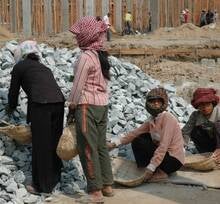Support least developed countries, including through financial and technical assistance, in building sustainable and resilient buildings utilizing local materials

Indicator 11.c.1 Number of jobs in the construction industry of LDCs involved in the manufacture of local building materials, out of the total number of jobs in the construction industry
The performance of the construction sector is important for the economic health of a country, and particularly relevant for enhancing resilience, sustainability and inclusiveness in Least Developed Countries. In addition, the use of local building materials can make a substantial contribution to a building’s sustainability, both in terms of embodied energy , resource-use and other life-cycle impacts.
Local building materials can be defined as materials of which the entire life cycle (extraction, manufacturing, sale, use and recycling) is tied to the same geographic region.The number of jobs in the manufacture of local building materials can indicate the share of green construction jobs that contribute to sustainable cities and human settlements and, by inference, the sustainability of the building sector as a whole. Often in LDCs, the construction industry is heavily dependent on the informal sector, making-up a substantial proportion of a country’s total output; both formal and informal jobs should therefore be taken into consideration.
The use of local building materials can reduce construction costs by 20-30%, can exhibit greatly reduced embodied energy and thus reduce CO2 emissions. The informal labour sector often makes up a substantial proportion of a country’s total output (50% of non-agricultural Gross Value Added in Sub-Saharan Africa, for instance). For every job in the construction industry it is estimated that an additional 3-5 jobs are generated in the local economy associated to this sector.
Our Work
Youth and construction skills
The Programme was developed in response to the request in 2014 from post-conflict states and the Secretary General´s Envoy on Youth to develop youth policies and programmes that support youth in post-conflict environments. It increases the engagement of the community to provide opportunities for young people, while at the same time increasing their aspirations and pathways for further education, training and employment opportunities.
Improve quality of basic services and access to health facilities
The 2010 health facility survey indicated that 77% of the existing health facilities have been affected by conflict, 67% need rehabilitation and 10% need complete reconstruction. The project is contributing to increased access to quality urban services and application of green building standards.
Budget: US$ 6,500,000
Developed in partneship with WHO, UNICEF and UNFPA
